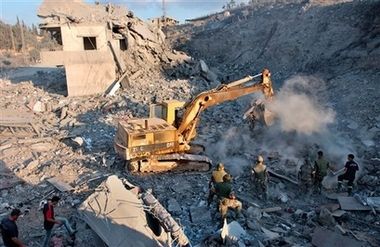 DAY 15, BEIRUT (Reuters) – Israel launched a heavy air and artillery bombardment of south Lebanon on Thursday after nine Israeli soldiers were killed in the Jewish state’s worst 24 hours for casualties in a 16-day-old conflict against Hizbollah. Israeli warplanes destroyed communication masts north of Beirut and attacked three trucks carrying medical and food supplies to the east, security sources said. They said two truck drivers were killed. Israel accuses Lebanon’s eastern neighbor Syria of supplying Hizbollah guerrillas with weapons.
DAY 15, BEIRUT (Reuters) – Israel launched a heavy air and artillery bombardment of south Lebanon on Thursday after nine Israeli soldiers were killed in the Jewish state’s worst 24 hours for casualties in a 16-day-old conflict against Hizbollah. Israeli warplanes destroyed communication masts north of Beirut and attacked three trucks carrying medical and food supplies to the east, security sources said. They said two truck drivers were killed. Israel accuses Lebanon’s eastern neighbor Syria of supplying Hizbollah guerrillas with weapons.
Other Israeli aircraft blasted targets in and around several villages and towns in the mainly Shi’ite Muslim south, and artillery batteries opened up from Israel’s side of the border.Hizbollah guerrillas killed nine Israeli soldiers in house-to-house fighting in a border town and a nearby village on Wednesday, as senior international diplomats failed at a Rome conference to agree on calling for an immediate ceasefire.
An Israeli general said the offensive, which has killed 433 Lebanese, mostly civilians, would go on "for several more weeks." The fighting began on July 12 when Hizbollah captured two Israeli soldiers and killed eight in a cross-border raid.A total of 51 Israelis have been killed in Hizbollah attacks that have included rockets being fired into northern Israel.Foreign ministers at the Rome conference pledged to work urgently for a "lasting, permanent and sustainable" ceasefire but did not call for the fighting to stop now, as Lebanon and its Arab allies had demanded.
U.S. Secretary of State Rice cautioned Syria and Iran Hizbollah’s main allies, that they faced further isolation if they tried to scupper U.S.-led attempts to get a ceasefire.
"This needs to be between Lebanon and Israel," Rice told reporters en route from Rome to Malaysia.
The United States has backed Israeli demands for Hizbollah to pull back from the border and ultimately disarm.
SYRIAN INVITATION
The Syrian ambassador to Britain, Sami Khiyami, said Rice should visit Damascus for talks. "If the United States does not change its policy in the Middle East, the whole Middle East will be on fire," he told the BBC in an interview.
Ali Larijani, secretary of Iran’s Supreme National Security Council and the country’s chief nuclear negotiator, flew to Damascus on Wednesday for talks with senior Syrian officials about the situation in the Middle East, diplomats said.
In stark contrast to Rice, U.N. Secretary-General Kofi Annan said Iran and Syria should be included in efforts to halt the war. Rice blames Tehran and Damascus for stoking the conflict.
Israel, Iran and Syria were not invited to the Rome talks.
In the Gaza Strip, scene of another Israeli offensive, Israeli forces killed 24 Palestinians, including at least 12 militants, during fighting.
Israel has killed 141 Palestinians in a month-long campaign to recover a soldier captured by Palestinian militants and stop rocket fire from Gaza.
Palestinian President Mahmoud Abbas said Lebanon and the Palestinian territories faced complete destruction.
"At the same time there is a refusal to reach a ceasefire that has been supported by European countries as well as Arab countries," Abbas told reporters on a visit to Algeria.
In the fighting in Lebanon, Lebanese security sources said Hizbollah guerrillas ambushed an Israeli force advancing on the town of Bint Jbeil, four km (2.5 miles) from the border.
The Israeli army said eight of its soldiers were killed at Bint Jbeil and 22 wounded. An Israeli officer was killed and three soldiers were wounded in a Hizbollah attack on the nearby village of Maroun al-Ras.
Israeli Prime Minister Ehud Olmert strove to limit diplomatic damage from the killing of four U.N. observers in an air strike on their post in south Lebanon on Tuesday. He told Annan he was sorry about the deaths but expressed shock at the U.N. leader’s suggestion the attack was deliberate.
An Irish army officer in south Lebanon warned Israel six times that air strikes threatened the lives of U.N. observers before Tuesday’s deaths, Ireland’s Foreign Ministry said.
Israeli bombing has forced an estimated 750,000 people in Lebanon to flee their homes. Many are trapped in areas where fighting is raging.
A large U.N. aid convoy reached the southern port of Tyre to distribute deliveries to an area devastated by Israeli bombing.



